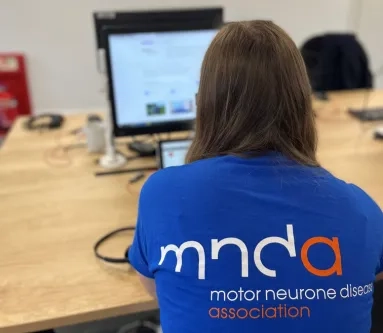What is MND?
Motor neurone disease (MND) affects the nerves known as motor neurones. These nerves tell your muscles what to do and are found in the brain and spinal cord.
Early signs of MND
Read more about the possible early signs of MND. If you are worried that you or someone close to you has MND, we're here to help.
Benefits, financial support and cost of living
We know that living with MND can affect your finances. Find out more about a range of benefits or other types of financial support we can provide.
Support for you
We’re here to help everyone living with and affected by MND in England, Wales and Northern Ireland access the help and support you need. Whether you want to speak to us over the phone, connect with others affected by MND or find local support, find out about the different ways we can help you below.
Find local support
We fund research, improve care and provide support for people with MND, their families and carers
138
grants in our research portfolio with a total value of over £26m
7,895
calls and emails were answered by our MND Connect helpline in 2024
3,142
people with MND were given 7339 grants in 2024, totalling over £3.2million
What's new?
Find out more about what's happening at the MND Association.
Read the latest news from across the Association
All news
Unlock The Door campaign sees councils adopt MND fast-track motion

Have your say on powered mobility devices

Join us today and help us support more people with MND
Help us support people affected by MND
Campaign
Campaign with us to make a real difference to the lives of people living with MND and their carers. Take action by getting involved with our current campaigns.
Donate
Make a one-off donation or sign up to be a Cure Finder to help fund research, improve care and provide support for people living with and affected by MND.
Fundraise
Whether you take part in an event or fundraise your own way, every penny you raise will make a difference to people with MND and their families.
Volunteer
There are lots of ways you can get involved and support the MND Association. Join over 7,000 people who volunteer their time.








